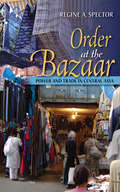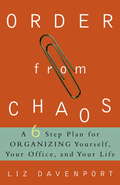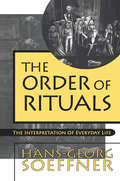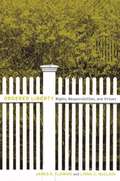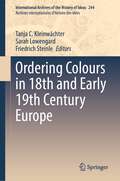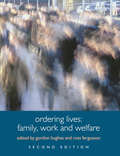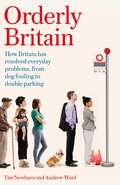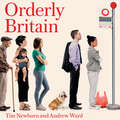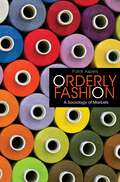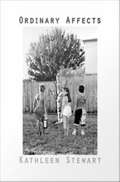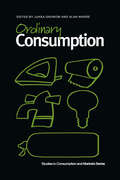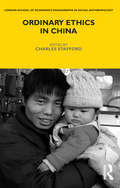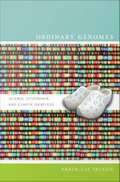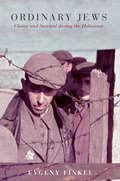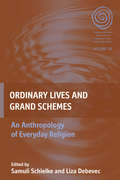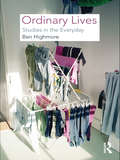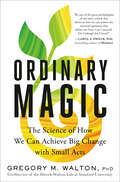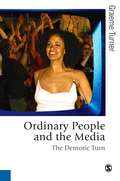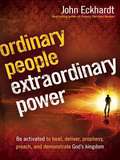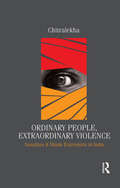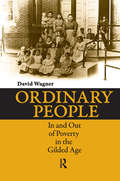- Table View
- List View
Order and Rebellion in Tribal Africa: Collected Essays with autobiographical introduction
by Max GluckmanCollected Essays with autobiographical introduction.
Order at the Bazaar: Power and Trade in Central Asia
by Regine A. SpectorOrder at the Bazaar delves into the role of bazaars in the political economy and development of Central Asia. Bazaars are the economic bedrock for many throughout the region—they are the entrepreneurial hubs of Central Asia. However, they are often regarded as mafia-governed environments that are largely populated by the dispossessed. By immersing herself in the bazaars of Kyrgyzstan, Regine A. Spector learned that some are rather best characterized as islands of order in a chaotic national context. Spector draws on interviews, archival sources, and participant observation to show how traders, landowners, and municipal officials create order in the absence of a coherent government apparatus and bureaucratic state. Merchants have adapted Soviet institutions, including trade unions, and pre-Soviet practices, such as using village elders as the arbiters of disputes, to the urban bazaar by building and asserting their own authority. Spector’s findings have relevance beyond the bazaars and borders of one small country; they teach us how economic development operates when the rule of law is weak.
Order from Chaos: A Six-Step Plan for Organizing Yourself, Your Office, and Your Life
by Liz DavenportLiz Davenport knows chaos. She lived the life of a disorganized office worker for years until the stress of lost papers and missed deadlines became too much. As a completely disorganized person, she knew the elaborate advice given in organization books would never bear the test of her workday and patience. So she sat down and developed a simple, pragmatic plan for order, a plan that changed her life. She now tours the country teaching other lost, disorganized souls her revolutionary plan for success. This book is different than all the other organizing books out there because of one thing: It's easy! In six straightforward steps Liz guts our desk, teaches us what's trash and why it's trash, how to organize the rest of it (and keep it that way), and tells us what a calendar is really meant to be. (By the way, to-do lists, in boxes, flurries of post-it notes, a palm pilot, day planner and desktop scribblings do not count as calendars. )Rather than offering complicated instructions for filing systems and time management "Order from Chaos" speaks simply and directly to the problem -- your mess -- and what exactly you can do about it.
Order in Chaos - Cybernetics of Brand Management (essentials)
by Oliver Errichiello Marius WernkeCybernetics is a science for understanding and systematically using information. As a subject of cybernetics, the brand is becoming increasingly important, especially in times of acceleration and infinite, global commodity markets. Only those who are able to preserve their patterns in the age of change and adapt them again and again to the requirements of the times will survive. Neither customer data nor creative ideas help here, but a sound knowledge of the structural functioning of all living beings - organic and social. By bringing together brand sociology and management cybernetics, this essential clarifies the invisible social forces of attraction. By illustrating the overarching dynamics of all (living) systems, universal insights can be gained and planned strategies developed.
Order of Rituals: The Interpretation of Everyday Life
by Hans-Georg SoeffnerTo those still accustomed to seeing social order depicted in classes, strata, central groups, or institutions, and who measure and classify the social world according to "centers" and "margins," modern society presents itself as ambiguous and unmanageable. This is not unprecedented. Human societies often discover themselves in situations in which the traditional grids of order and stratification lose their value and fail to serve as guideposts for individuals.In The Order of Rituals, Hans-Georg Soeffner aims to answer the question: Through what efforts of order and orientation are loosely organized societies like ours held together? Soeffner focuses on symbolic forms of self-presentation that bring focus and clarity to our lives, such as emblems, fashions, styles, and symbols. As these replace old orders of classes or strata, there is a further consequence. Economically, culturally, and ethnically "mixed" societies not only return to specific visible forms of presentation, but also present themselves and their worldviews as a public stage of life-styles, attitudes, and demeanor.Soeffner asserts that society preserves certain continuously handed-down forms of action and ritual as specific symbolic forms over a long period of time. The Order of Rituals describes these symbols and routines of everyday life in fascinating detail, coupled with thoughtful analysis. Sociologists, anthropologists, and philosophers will all benefit immensely from this book.
Order on the Edge of Chaos
by Edward J. LawlerOrder and stability are tenuous and fragile. People have to work to create and sustain a semblance of stability and order in their lives and in their organizations and larger communities. Order on the Edge of Chaos compares different ideas about how we coordinate and cooperate. The ideas come from 'micro-sociology', and they offer new answers to the classic question of Thomas Hobbes: 'how is social order possible?' The most common answers in sociology, political science, and economics assume a fundamental tension between individual and group interests. This volume reveals that social orders are problematic even without such tension, because when people interact with each other, they verify their identities, feel and respond to emotions, combine different goal frames, and develop shared responsibility. The ties of people to groups result from many aspects of their social interactions, and these cannot be explained by individual self-interest.
Ordered Liberty: Rights, Responsibilities, and Virtues
by Linda C. Mcclain James E. FlemingMany have argued in recent years that the U. S. constitutional system exalts individual rights over responsibilities, virtues, and the common good. Answering the charges against liberal theories of rights, James Fleming and Linda McClain develop and defend a civic liberalism that takes responsibilities and virtues-as well as rights-seriously. They provide an account of ordered liberty that protects basic liberties stringently, but not absolutely, and permits government to encourage responsibility and inculcate civic virtues without sacrificing personal autonomy to collective determination. The battle over same-sex marriage is one of many current controversies the authors use to defend their understanding of the relationship among rights, responsibilities, and virtues. Against accusations that same-sex marriage severs the rights of marriage from responsible sexuality, procreation, and parenthood, they argue that same-sex couples seek the same rights, responsibilities, and goods of civil marriage that opposite-sex couples pursue. Securing their right to marry respects individual autonomy while also promoting moral goods and virtues. Other issues to which they apply their idea of civic liberalism include reproductive freedom, the proper roles and regulation of civil society and the family, the education of children, and clashes between First Amendment freedoms (of association and religion) and antidiscrimination law. Articulating common ground between liberalism and its critics, Fleming and McClain develop an account of responsibilities and virtues that appreciates the value of diversity in our morally pluralistic constitutional democracy.
Ordering Colours in 18th and Early 19th Century Europe (International Archives of the History of Ideas Archives internationales d'histoire des idées #244)
by Friedrich Steinle Sarah Lowengard Tanja C. KleinwächterThis book describes the international effort to give order to colours and thus facilitate communication about it, two topics deemed essential to a modernising world that were also recognizably complex. Expert essays will enhance readers' understanding of the struggle to coordinate nature with art at a time when approaches to both were undergoing rapid change. Ordering Colours shows how such seemingly trivial concerns as identifying the basic colours and disseminating appropriate colour diagrams had to meet philosophical, scientific and professional needs across Europe. Contributors detail the many schemes for colour systematization and their real-world applications; questions of concern to both academic- and manufacturing-focused investigators throughout the long 18th century. They bring together original research and new thinking about landmark early modern studies to address important developments as well as neglected historical contributions of European arts, sciences, and economies. This collection is an important addition to the libraries of all who are interested in public culture and manufacturing developments in the early modern period and is aimed at historians of art, technology, philosophy and physics.
Ordering Lives: Family, Work and Welfare (Understanding Social Change)
by Gordon Hughes Ross FergussonTaking as its focus three familiar and profoundly influential social institutions, the family, work and welfare, this accessible and exciting text looks at their role in maintaining social order and promoting social change in Britain from the 1950's to the beginning of the twenty first century. It shows how everyday life within these institutions is marked by the exercise of power and resistance and it charts the ways in which wider social change has affected these processes.Ordering Lives: Family, Work and Welfare engages with some of the most pressing issues affecting our society in a lively yet academically rigorous manner. At the same time, it offers students of the social sciences a crucial first introduction to the way that theory is used in social science explanations of social relations and institutional arrangements.This is a key introductory text for all students beginning study in sociology, social policy or general social sciences. Does it any longer make sense to talk about a "welfare state" in today's UK?
Orderly Britain: How Britain has resolved everyday problems, from dog fouling to double parking
by Andrew Ward Tim NewburnHow do British pavements remain free of dog mess? Why are paths not littered with cigarette butts or roads not lined with abandoned cars? What does the decline of the public lavatory say about us and is the national reputation for queuing still deserved today?Orderly Britain takes a topical look at modern society, examining how it is governed and how it organises itself. It considers the rules of daily life, where they come from and why they exist. It asks whether citizens are generally compliant and uncomplaining or rebellious and defiant. This quirky social history takes a close look at shifting customs and practices, people's expectations of each other and how rule-makers seek to shape everyone's lives - even when ignoring some of those rules themselves.Taking the reader on a journey that covers a range of topics - dog mess, smoking, drinking, parking, queuing, toilets - Orderly Britain examines the rapidly changing patterns of everyday life, from post-war to present day, and concludes with an extended look at the unparalleled shifts in social routines that resulted from the global COVID-19 pandemic. Asking whether it is the proliferation of rules and regulations in the UK or something else that keeps people in line, authors Tim Newburn and Andrew Ward offer a unique insight into what creates orderly Britons.
Orderly Britain: How Britain has resolved everyday problems, from dog fouling to double parking
by Andrew Ward Tim NewburnHow do British pavements remain free of dog mess? Why are paths not littered with cigarette butts or roads not lined with abandoned cars? What does the decline of the public lavatory say about us and is the national reputation for queuing still deserved today?Orderly Britain takes a topical look at modern society, examining how it is governed and how it organises itself. It considers the rules of daily life, where they come from and why they exist. It asks whether citizens are generally compliant and uncomplaining or rebellious and defiant. This quirky social history takes a close look at shifting customs and practices, people's expectations of each other and how rule-makers seek to shape everyone's lives - even when ignoring some of those rules themselves.Taking the reader on a journey that covers a range of topics - dog mess, smoking, drinking, parking, queuing, toilets - Orderly Britain examines the rapidly changing patterns of everyday life, from post-war to present day, and concludes with an extended look at the unparalleled shifts in social routines that resulted from the global COVID-19 pandemic. Asking whether it is the proliferation of rules and regulations in the UK or something else that keeps people in line, authors Tim Newburn and Andrew Ward offer a unique insight into what creates orderly Britons.
Orderly Britain: How Britain has resolved everyday problems, from dog fouling to double parking
by Andrew Ward Tim NewburnHow do British pavements remain free of dog mess? Why are paths not littered with cigarette butts or roads not lined with abandoned cars? What does the decline of the public lavatory say about us and is the national reputation for queuing still deserved today?Orderly Britain takes a topical look at modern society, examining how it is governed and how it organises itself. It considers the rules of daily life, where they come from and why they exist. It asks whether citizens are generally compliant and uncomplaining or rebellious and defiant. This quirky social history takes a close look at shifting customs and practices, people's expectations of each other and how rule-makers seek to shape everyone's lives - even when ignoring some of those rules themselves.Taking the reader on a journey that covers a range of topics - dog mess, smoking, drinking, parking, queuing, toilets - Orderly Britain examines the rapidly changing patterns of everyday life, from post-war to present day, and concludes with an extended look at the unparalleled shifts in social routines that resulted from the global COVID-19 pandemic. Asking whether it is the proliferation of rules and regulations in the UK or something else that keeps people in line, authors Tim Newburn and Andrew Ward offer a unique insight into what creates orderly Britons.
Orderly Fashion: A Sociology of Markets
by Patrik AspersFor any market to work properly, certain key elements are necessary: competition, pricing, rules, clearly defined offers, and easy access to information. Without these components, there would be chaos. Orderly Fashion examines how order is maintained in the different interconnected consumer, producer, and credit markets of the global fashion industry. From retailers in Sweden and the United Kingdom to producers in India and Turkey, Patrik Aspers focuses on branded garment retailers--chains such as Gap, H&M, Old Navy, Topshop, and Zara. Aspers investigates these retailers' interactions and competition in the consumer market for fashion garments, traces connections between producer and consumer markets, and demonstrates why market order is best understood through an analysis of its different forms of social construction. Emphasizing consumption rather than production, Aspers considers the larger retailers' roles as buyers in the production market of garments, and as potential objects of investment in financial markets. He shows how markets overlap and intertwine and he defines two types of markets--status markets and standard markets. In status markets, market order is related to the identities of the participating actors more than the quality of the goods, whereas in standard markets the opposite holds true. Looking at how identities, products, and values create the ordered economic markets of the global fashion business, Orderly Fashion has wide implications for all modern markets, regardless of industry.
Ordinary Affects
by Kathleen StewartOrdinary Affects is a singular argument for attention to the affective dimensions of everyday life and the potential that animates the ordinary. Known for her focus on the poetics and politics of language and landscape, the anthropologist Kathleen Stewart ponders how ordinary impacts create the subject as a capacity to affect and be affected. In a series of brief vignettes combining storytelling, close ethnographic detail, and critical analysis, Stewart relates the intensities and banalities of common experiences and strange encounters, half-spied scenes and the lingering resonance of passing events. While most of the instances rendered are from Stewart's own life, she writes in the third person in order to reflect on how intimate experiences of emotion, the body, other people, and time inextricably link us to the outside world. Stewart refrains from positing an overarching system--whether it's called globalization or neoliberalism or capitalism--to describe the ways that economic, political, and social forces shape individual lives. Instead, she begins with the disparate, fragmented, and seemingly inconsequential experiences of everyday life to bring attention to the ordinary as an integral site of cultural politics. Ordinary affect, she insists, is registered in its particularities, yet it connects people and creates common experiences that shape public feeling. Through this anecdotal history--one that poetically ponders the extremes of the ordinary and portrays the dense network of social and personal connections that constitute a life--Stewart asserts the necessity of attending to the fleeting and changeable aspects of existence in order to recognize the complex personal and social dynamics of the political world.
Ordinary Consumption (Studies in Consumption and Markets)
by Alan Warde Jukka GronowFirst published in 2001. Routledge is an imprint of Taylor & Francis, an informa company.
Ordinary Ethics in China (LSE Monographs on Social Anthropology)
by Charles StaffordDrawing on a wide range of anthropological case studies, this book focuses on ordinary ethics in contemporary China. The book examines the kinds of moral and ethical issues that emerge (sometimes almost unnoticed) in the flow of everyday life in Chinese communities.How are schoolchildren judged to be good or bad by their teachers and their peers - and how should a 'bad' student be dealt with? What exactly do children owe their parents, and how should this debt be repaid? Is it morally acceptable to be jealous if one's neighbours suddenly become rich? Should the wrongs of the past be forgotten, e.g. in the interests of communal harmony, or should they be dealt with now?In the case of China, such questions have obviously been shaped by the historical contexts against which they have been posed, and by the weight of various Chinese traditions. But this book approaches them on a human scale. More specifically, it approaches them from an anthropological perspective, based on participation in the flow of everyday life during ethnographic fieldwork in Chinese communities.
Ordinary Genomes: Science, Citizenship, and Genetic Identities
by Karen-Sue TaussigOrdinary Genomes is an ethnography of genomics, a global scientific enterprise, as it is understood and practiced in the Netherlands. Karen-Sue Taussig's analysis of the Dutch case illustrates how scientific knowledge and culture are entwined: Genetics may transform society, but society also transforms genetics. Taussig traces the experiences of Dutch people as they encounter genetics in research labs, clinics, the media, and everyday life. Through vivid descriptions of specific diagnostic processes, she illuminates the open and evolving nature of genetic categories, the ways that abnormal genetic diagnoses are normalized, and the ways that race, ethnicity, gender, and religion inform diagnoses. Taussig contends that in the Netherlands ideas about genetics are shaped by the desire for ordinariness and the commitment to tolerance, two highly-valued yet sometimes contradictory Dutch social ideals, as well as by Dutch history and concerns about immigration and European unification. She argues that the Dutch enable a social ideal of tolerance by demarcating and containing difference so as to minimize its social threat. It is within this particular construction of tolerance that the Dutch manage the meaning of genetic difference.
Ordinary Jews: Choice and Survival during the Holocaust
by Evgeny FinkelFocusing on the choices and actions of Jews during the Holocaust, Ordinary Jews examines the different patterns of behavior of civilians targeted by mass violence. Relying on rich archival material and hundreds of survivors' testimonies, Evgeny Finkel presents a new framework for understanding the survival strategies in which Jews engaged: cooperation and collaboration, coping and compliance, evasion, and resistance. Finkel compares Jews' behavior in three Jewish ghettos—Minsk, Kraków, and Białystok—and shows that Jews' responses to Nazi genocide varied based on their experiences with prewar policies that either promoted or discouraged their integration into non-Jewish society. Finkel demonstrates that while possible survival strategies were the same for everyone, individuals' choices varied across and within communities. In more cohesive and robust Jewish communities, coping—confronting the danger and trying to survive without leaving—was more organized and successful, while collaboration with the Nazis and attempts to escape the ghetto were minimal. In more heterogeneous Jewish communities, collaboration with the Nazis was more pervasive, while coping was disorganized. In localities with a history of peaceful interethnic relations, evasion was more widespread than in places where interethnic relations were hostile. State repression before WWII, to which local communities were subject, determined the viability of anti-Nazi Jewish resistance.Exploring the critical influences shaping the decisions made by Jews in Nazi-occupied eastern Europe, Ordinary Jews sheds new light on the dynamics of collective violence and genocide.
Ordinary Lives And Grand Schemes
by Samuli Schielke Liza DebevecEveryday practice of religion is complex in its nature, ambivalent and at times contradictory. The task of an anthropology of religious practice is therefore precisely to see how people navigate and make sense of that complexity, and what the significance of religious beliefs and practices in a given setting can be. Rather than putting everyday practice and normative doctrine on different analytical planes, the authors argue that the articulation of religious doctrine is also an everyday practice and must be understood as such.
Ordinary Lives: Studies in the Everyday
by Ben HighmoreThis new study from Ben Highmore looks at the seemingly banal world of objects, work, daily media, and food, and finds there a scintillating array of passionate experience. Through a series of case studies, and building on his previous work on the everyday, Highmore examines our relationship to familiar objects (a favourite chair), repetitive work (housework, typing), media (distracted television viewing and radio listening) and food (specifically the food of multicultural Britain). A chair allows him to consider the history of flat-pack furniture as well as the lively presence of inorganic ‘stuff’ in our daily lives. Distracted television watching and radio listening becomes one of the preconditions for experiencing wonder through the media. Ordinary Lives links the concrete study of routine existence to theoretical reflection on everyday life. The book discusses philosophers such as Jacques Rancière, William James and David Hume and combines them with autobiographical testimonies, historical research and the analysis of popular culture to investigate the minutiae of day-to-day life. Highmore argues that aesthetic experience is embedded in the mundane sensory world of everyday life. He asks the reader to reconsider the negative associations of habit and routine, focusing specifically on the intrinsic ambiguity of habit (habit, we find out, is both rigid and adaptive). Rather than ask ‘what does everyday life mean?’ this book asks ‘what does everyday life feel like and how do our sensual, emotional and temporal experiences interconnect and intersect?’ Ordinary Lives is an accessible, animated and engaging book that is ideally suited to both students and researchers working in cultural studies, media and communication and sociology.
Ordinary Magic: The Science of How We Can Achieve Big Change with Small Acts
by Gregory M. Walton PhD&“By one of the great psychologists of our time, a book that shows us how we can answer the universal questions that define our lives: Can I succeed? Do I belong? Am I loved?&”—Carol S. Dweck, PhD, bestselling author of Mindset Discover simple psychological shifts that build trust, belonging, and confidence—from the co-director of the Dweck-Walton Lab at Stanford University The emotional questions we face can define our lives. If you&’re expecting an interaction to go wrong, that expectation can make it so. That&’s spiraling down.But as esteemed Stanford psychologist Greg Walton shows, when we see these questions clearly, we can answer them well. Known to social psychologists as wise interventions, these shifts in perspective can help us chart new trajectories for our lives. They help us spiral up.This is ordinary magic: The ordinary experiences that help us set aside the ordinary worries of life to unleash extraordinary change.Through vivid storytelling and insightful analysis of fascinating research—both his own and others&’—Dr. Walton pulls back the curtain to reveal the magic at work:• With our children: The few choice words from a parent or a teacher that builds trust and achievement.• In our relationships: How the right opportunity to reflect, for just a few minutes before a conflict conversation, can engender greater intimacy among couples—even a year later.• In school: How learning that everyone feels as out of place at first as you do at a new school—they really do—can unleash extraordinary potential, improving your life a decade later.• In our policy: how a one-page letter reduced recidivism among kids returning to school from juvenile detention by 40 percentage points; a postcard campaign cut suicide rates in half.It&’s easy to think problems are out of our control. But in fact, we have vast opportunities for change. Ordinary Magic puts the tools for change at your fingertips.
Ordinary People and the Media: The Demotic Turn (Published in association with Theory, Culture & Society)
by Graeme TurnerThe 'demotic turn' is a term coined by Graeme Turner to describe the increasing visibility of the 'ordinary person' in the media today. In this dynamic and insightful book he explores the 'whys' and 'hows' of the 'everyday' individual's willingness to turn themselves into media content through: · Celebrity culture, · Reality TV, · DIY websites, · Talk radio, · User-generated materials online. Initially proposed in order to analyse the pervasiveness of celebrity culture, this book further develops the idea of the demotic turn as a means of examining the common elements in a range of 'hot spots' in debates within media and cultural studies today. Refuting the proposition that the demotic turn necessarily carries with it a democratising politics, this book examines the political and cultural function of the demotic turn in media production and consumption across the fields of reality TV, print and electronic news and current affairs journalism, citizen and online journalism, talk radio, and user-generated content online. It examines these fields in order to outline a structural shift in what the western media has been doing lately, and to suggest that these media activities represent something much more fundamental than contemporary media fashion.
Ordinary People, Extraordinary Power: Be Activated To Heal, Deliver, Prophesy, Preach, And Demonstrate God's Kingdom
by John Eckhardt<p class="description">SUMMARY:<br>In today's world we need Christians and churches willing to break out of the normal patterns of religion and tradition to impact and reach the world. Ordinary People, Extraordinary Power gives a strong case for the apostolic culture as a criterion for change in the church today. A culture is a way of life of a group of peoplethe behaviors, beliefs, values, and symbols that they accept, generally without thinking about them, and that are passed along by communication and imitation from one generation to the next. An apostolic culture is simply the ways, beliefs, behavior, and values of God's people. It is a culture of power and the Holy Spirit. Apostolic leaders will impart power and authority to the members. Believers need to be activated to heal, deliver, prophesy, and preach. They must be activated to demonstrate the kingdom. The apostolic culture includes worship, deliverance, apostolic teams, prophecy, ordaining, establishing, pioneering, evangelizing, prayer, teaching, helps, governments, missions, healing, the Gifts of the Spirit, holiness, impartation, and church government. All of these will be discussed in this book in order to help leaders and believers move in apostolic power and authority.</p>
Ordinary People, Extraordinary Violence: Naxalites and Hindu Extremists in India
by ChitralekhaThe book engages with an urgent and disturbing question: how are ordinary people readied to willingly kill others in the name of a cause? It compares narratives of actors in domains often assumed incomparable in academic discourse: Naxalites studied within the framework of peasant rebellion, social movement or recently even terrorism, and Hindu rioters viewed mostly under the broad rubric of ethnic violence. The book draws from the author’s extensive and painstaking fieldwork, first with Naxalite armed cadre across seven districts in Jharkhand and Bihar, and later with participants in the 2002 riots in Gujarat. Viewed from the standpoint of the perpetrator or foot soldier, the book bridges hitherto sacrosanct boundaries between left-extremist and communal violence, making available a whole new dimension to the study of social mobilisation, the politics of identity and, with far reaching implications, discovers deep commonalities in the life-worlds and aspirations of those motivated to kill in the name of a cause in apparently disparate contexts.The findings of this compelling analysis of human actors — ordinary people driven to extraordinary violence — will interest the informed general reader, as also those interested in sociology, politics, violence studies, ethnic movements, Naxalism, policy studies, and peace & conflict studies.
Ordinary People: In and Out of Poverty in the Gilded Age
by David WagnerDavid Wagner explores the lives of poor people during the three decades after the Civil War, using a unique treasure of biographies of people who were (at one point in time) inmates in a large almshouse, combined with genealogical and other official records to follow their later lives. Ordinary People develops a more fluid picture of "poverty" as people's lives change over the course of time.

